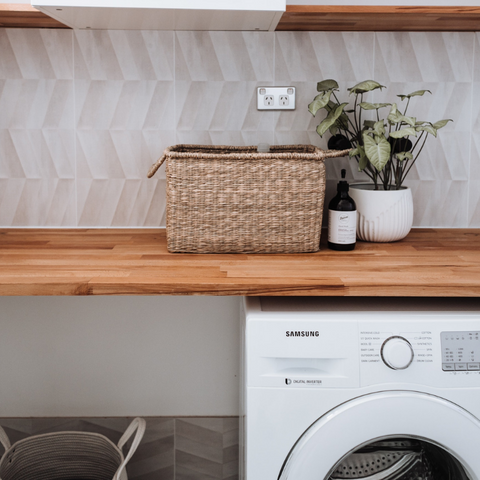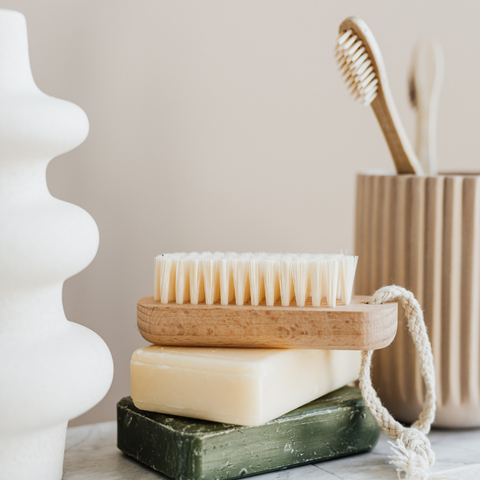
10 Ways to Reduce Microplastic Pollution
Are you familiar with Microplastic Pollution? You may be shocked to learn that textiles are the largest source of primary microplastics, accounting for 34.8% of global microplastic pollution [1]. The facts and statistics are jarring, but every single one of us has the power to make a change.
Today we’re giving you the lowdown on what microplastics are, how they impact our planet, and what you can do to help.
What are microfibres/microplastics?
Microplastics are tiny pieces of plastic that are less than 5mm in length. Microfibres are a type of microplastic that are released when we wash synthetic materials, like clothing made of acrylic or polyester.
Why is it harmful?
When microfibres are released from our clothing in the wash, they end up in our wastewater. That wastewater ends up in our sewage systems, which goes to water treatment facilities. But due to the size of these tiny fibers, they can pass through filtration systems and end up in our lakes, rivers, and oceans.
What can we do about it?
There are countless ways we can reduce Microplastic Pollution. Here are 10 of our favourites!
-
Stop using single use plastic items like water bottles, cutlery, disposable beverage cups, and plastic bags. While it may feel daunting, it’s totally doable and all comes down to being prepared. Put together a reusables kit that you take everywhere you go equipped with: a cloth bag, a set of reusable cutlery/straw, a travel mug for grabbing drinks on the go, and of course a trusty water bottle. Make this kit your best friend and say goodbye to single-use plastic for good!

-
Reduce driving. Tires shed microplastics onto the road which end up in our waterways; this is known as roadway abrasion [2]. Live in a big city? Consider walking, biking, or taking public transportation more often. If these aren’t accessible to you, consider carpooling with a friend or family member to lessen your impact.

-
When doing your laundry, use a wash bag like GUPPYFRIEND to catch micro plastic so you can dispose of them properly. GUPPYFRIEND Washing Bags are an effective, scientifically proven solution that reduces fibre shedding, protects your clothes, filters the microfibres that do break and doesn’t lose any fibres itself. It’s a daily reminder to change our buying habits and washing rituals. You can now purchase a Guppyfriend wash bag directly from Encircled.

-
Wash your clothing in cold water. Water heating consumes about 90% of the energy it takes to operate a washing machine [3]. Washing in cold water drastically reduces your energy usage (and bill), and is more gentle on your clothes (which leads to less microplastic shedding).

-
Purchase clothing made from natural fabrics. Did you know 35.0% of our Oceans’ microplastics come from synthetic fabrics [5]? Opting for natural fabrics like our core Modal, Tencel Lyocell, Rayon from Bamboo, Organic Cotton, and Linen fabrics is a fantastic solution.

-
Go plastic-free with your personal care routine! There are so many great low-waste and plastic-free beauty and personal care products available on the market now so we no longer need to compromise quality and effectiveness for sustainability. Use directories such as this one to get started on your search.

-
Advocate for nurdle bans and regulations by writing to your local Members of Parliament, City Councilors, and elected officials. When election season comes around, advocate with your vote.

-
Organize a beach/lake/waterway or park cleanup! Do good and get social- it’s a total win, win! If you need a place to start, check out organizations like The Great Canadian Shoreline Cleanup, Ocean Watch in BC, and World Clean Up Day.

-
Support and share about organizations that advocate for better microplastic regulations, such as Surfrider, Plastic Pollution Coalition, Plastic Oceans, and The Ocean Clean Up.

-
Reduce your fish consumption. This is one of the most impactful ways to reduce our output of single-use plastic since the majority of ocean plastic comes from fishing nets and fishing equipment [4].

SOURCES:
[1] https://portals.iucn.org/library/sites/library/files/documents/2017-002-En.pdf
[2] https://www.celticwater.co.uk/bloghow-does-plastic-get-into-the-ocean-plastic-pollution-from-roads/
[3] https://www.energystar.gov/products/laundry_best_practices
[4] https://www.seashepherdglobal.org/latest-news/marine-debris-plastic-fishing-gear/






1 comment
This blog was extremely helpful for me. The level of detail in your descriptions is praiseworthy. Thank you for your efforts.
Leave a comment